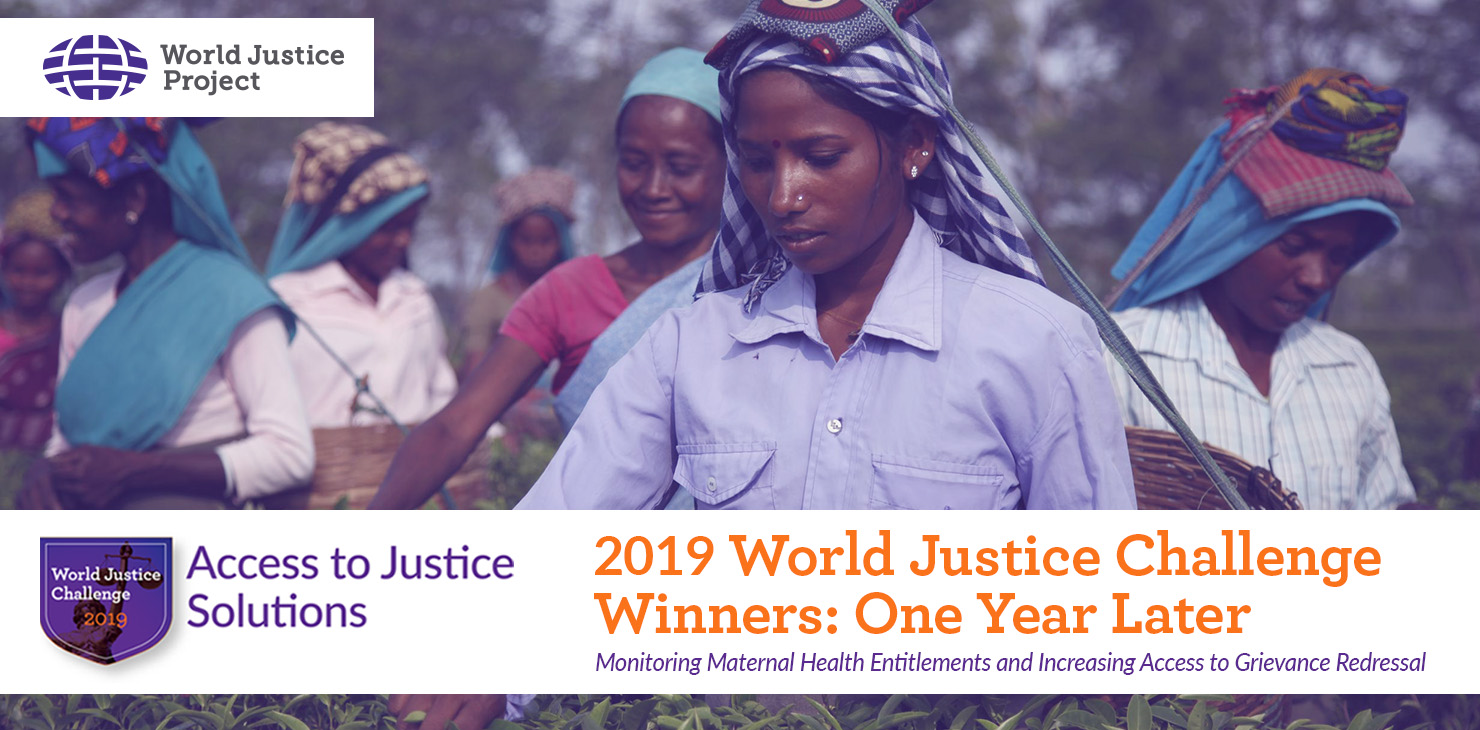

One year ago, the World Justice Forum 2019 concluded with the announcement of the winners of the 2019 World Justice Challenge: Access to Justice Solutions. To mark this occasion, WJP is catching up with each winning project to learn how their work has evolved over the past year, the challenges they face, and how the World Justice Challenge prize money has bolstered their work.
Monitoring Maternal Health Entitlements and Increasing Access to Grievance Redressal
Nazdeek – India
The State of Assam experiences the highest maternal mortality rate in India. Health concerns are compounded on tea plantations where workers face substandard working conditions that negatively impact their health. This project developed grievance forums to identify and monitor rights violations, provide a mechanism for communities and the legal/administrative systems to discuss issues and concerns, and ultimately assist women in seeking redress for their maternal and child health problems.
What has changed for the project in the last year?
Over the course of the past year, the project has continued to increase women's access to justice by training paralegals in Delhi and Assam, engaging in advocacy, and seeking redress for rights violations from government authorities. Nazdeek also undertook an extensive scoping study about the relevance of legal empowerment work with women in the textile and garment industry in the state of Tamil Nadu, and as a result, will start work there soon. The team has added three members, which has enabled it to continue their existing work and expand into new areas.
Paralegals have become the centerpiece of the project. Through years of engagement, the paralegals have gained a strong understanding of the legal rights and entitlements of the communities they work with and how to advocate through government channels. These volunteers and the community have limited access or literacy in terms of technology. Therefore, Nazdeek has moved to offline methods of disseminating information and collecting data for advocacy, and is working with a state-wide collective of indigenous women in Assam (the All Adivasi Women's Association of Assam) to reach isolated communities.
What challenges has the project faced?
The project has been beset by challenges created by rollbacks on certain human rights provisions by the Indian government:
- Amendments to relevant laws, increasing the justice gap for marginalized communities:
- In the June-July 2019 budget session, the Parliament of India amended several laws that will have an impact on Nazdeek's work. The Right to Information Act of 2006 was diluted through the Amendment Act of 2019, impacting the independence of various bodies that guarantee freedom of information to citizens.
- India is consolidating its 44 labor laws into 4 different labor codes, overhauling the country's labor rights provisions. In this context, the living and working conditions of women tea plantation workers will be directly affected.
- Bureaucratic red tape and the lack of consistent updates to the government directory for redressing grievances have meant that paralegals and the community of workers are still faced with a long drawn-out process to make their grievances heard. Additionally, the fear of government retaliation results in under-reporting of violations and deficiencies.
- The COVID-19 crisis caused the national government to impose a nation-wide lockdown on March 24th, scheduled to end on May 17th. As a result, many workers in the informal sector have lost their jobs, and hunger has become a huge crisis. The government's measures to confront the crisis have failed to reach communities Nazdeek works with. Tea plantation workers were not paid their wages during the two first weeks of lockdown and are now back to work despite severe health concerns.
How has winning the 2019 World Justice Challenge made an impact on the project?
The prize money has been used for the core funding of Nazdeek's activities. This helped strengthen their advocacy efforts in Assam and Delhi, and expand both their team and their work to different regions across the country, as mentioned above.
"The World Justice Forum experience was itself a powerful one and the World Justice Challenge provided an excellent platform to showcase the work and inspiring stories of the women community paralegals that we work with. Specifically, we benefited from the (..) networking and learning exchange (…). The expo village was helpful in giving us a chance to learn about similar projects in different contexts around the world. We were particularly able to deepen our engagement (with local partners) and visited SRS in Bangladesh to understand their challenges and opportunities when working with (Textile and Garment) workers in a similar context in South Asia. (…) Being the second generation in leadership at Nazdeek, it was very special for both representatives to meet with experts who supported Nazdeek in the initial years of the organization. We continued our engagement with Fred Rooney and Walter Flores long after the event to leverage their expertise on different aspects of the work such as legal incubation and community-led monitoring."
Learn more about the Partnering for Native Health project in WJP's Program Library.
The winning projects of the World Justice Challenge 2019: Access to Justice Solutions were among 30 finalists chosen from over 250 applications from around the world at the World Justice Forum in The Hague. They each represent innovative efforts to bring justice to individuals and communities that have seen little of it in the past. We are pleased to share their latest work and encourage the rule of law community to participate in our upcoming World Justice Challenge 2021. Stay tuned for a 2021 Challenge announcement coming this fall.






